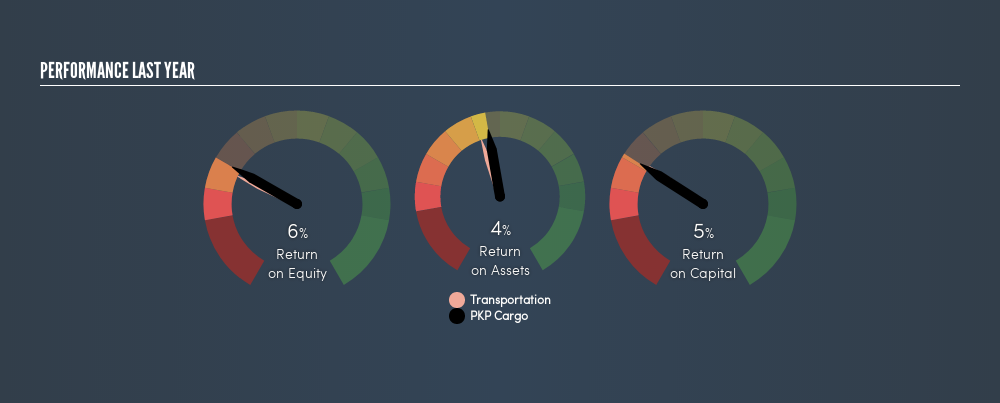
Want to participate in a short research study? Help shape the future of investing tools and receive a $20 prize!
Today we'll look at PKP Cargo S.A. (WSE:PKP) and reflect on its potential as an investment. In particular, we'll consider its Return On Capital Employed (ROCE), as that can give us insight into how profitably the company is able to employ capital in its business.
First of all, we'll work out how to calculate ROCE. Second, we'll look at its ROCE compared to similar companies. Then we'll determine how its current liabilities are affecting its ROCE.
What is Return On Capital Employed (ROCE)?
ROCE is a metric for evaluating how much pre-tax income (in percentage terms) a company earns on the capital invested in its business. All else being equal, a better business will have a higher ROCE. Overall, it is a valuable metric that has its flaws. Author Edwin Whiting says to be careful when comparing the ROCE of different businesses, since 'No two businesses are exactly alike.'
How Do You Calculate Return On Capital Employed?
The formula for calculating the return on capital employed is:
Return on Capital Employed = Earnings Before Interest and Tax (EBIT) ÷ (Total Assets - Current Liabilities)
Or for PKP Cargo:
0.051 = zł90m ÷ (zł6.6b - zł1.2b) (Based on the trailing twelve months to September 2018.)
So, PKP Cargo has an ROCE of 5.1%.
See our latest analysis for PKP Cargo
Is PKP Cargo's ROCE Good?
ROCE is commonly used for comparing the performance of similar businesses. It appears that PKP Cargo's ROCE is fairly close to the Transportation industry average of 5.5%. Independently of how PKP Cargo compares to its industry, its ROCE in absolute terms is low; especially compared to the ~2.9% available in government bonds. There are potentially more appealing investments elsewhere.

When considering ROCE, bear in mind that it reflects the past and does not necessarily predict the future. ROCE can be deceptive for cyclical businesses, as returns can look incredible in boom times, and terribly low in downturns. This is because ROCE only looks at one year, instead of considering returns across a whole cycle. What happens in the future is pretty important for investors, so we have prepared a freereport on analyst forecasts for PKP Cargo.
How PKP Cargo's Current Liabilities Impact Its ROCE
Liabilities, such as supplier bills and bank overdrafts, are referred to as current liabilities if they need to be paid within 12 months. Due to the way ROCE is calculated, a high level of current liabilities makes a company look as though it has less capital employed, and thus can (sometimes unfairly) boost the ROCE. To check the impact of this, we calculate if a company has high current liabilities relative to its total assets.
PKP Cargo has total liabilities of zł1.2b and total assets of zł6.6b. As a result, its current liabilities are equal to approximately 18% of its total assets. This is not a high level of current liabilities, which would not boost the ROCE by much.
Our Take On PKP Cargo's ROCE
PKP Cargo has a poor ROCE, and there may be better investment prospects out there. But note: PKP Cargo may not be the best stock to buy. So take a peek at this freelist of interesting companies with strong recent earnings growth (and a P/E ratio below 20).
If you are like me, then you will not want to miss this freelist of growing companies that insiders are buying.
We aim to bring you long-term focused research analysis driven by fundamental data. Note that our analysis may not factor in the latest price-sensitive company announcements or qualitative material.
If you spot an error that warrants correction, please contact the editor at editorial-team@simplywallst.com. This article by Simply Wall St is general in nature. It does not constitute a recommendation to buy or sell any stock, and does not take account of your objectives, or your financial situation. Simply Wall St has no position in the stocks mentioned. On rare occasion, data errors may occur. Thank you for reading.
About WSE:PKP
Pkp Cargo
Engages in the transport of goods and the provision of logistics services in the field of rail freight in Poland and internationally.
Moderate growth potential with mediocre balance sheet.


